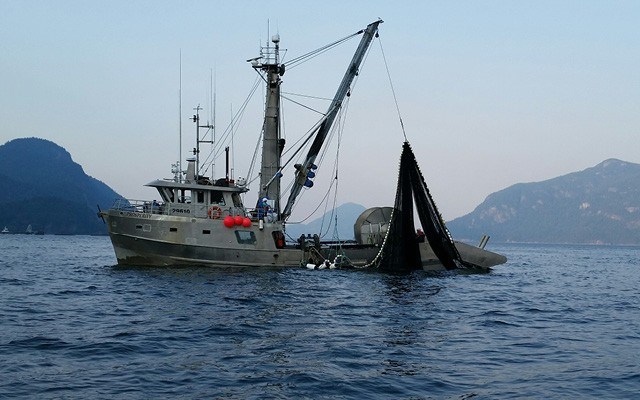As more details emerge on the early closure of a contentious salmon fishery near Squamish, conservationists are pointing to a deepening culture of denial at Fisheries and Oceans Canada (DFO).
This summer, the federal department shut down a commercial pink salmon fishery on Howe Sound scheduled for Aug. 10 to 15 after just two days. The DFO said the fishery was shuttered after it was discovered there wasn't "the abundance of fish" originally expected — despite prior warnings from local anglers of a weak pink salmon run.
However, more questions were raised after industry observers received a tip from the public that the participating fishing boats may have caught salmon in a prohibited area at the mouth of the Squamish River.
"When I asked the DFO representative directly in charge of managing that fishery whether those rumours were true, they basically said no," explained Aaron Hill, executive director of non-profit Watershed Watch Salmon Society.
While it was revealed weeks later that the boats had not only failed to follow the prescribed fishing routes, but that one vessel had caught more than the 25,000 fish permitted per day, information on the closure was hard to come by, with officials denying any violation had taken place.
When Hill continued pressing the department, he said the response he got back was one of "obfuscation and denial, which is so typical, unfortunately, of the way the Department of Fisheries and Oceans interacts with conservation groups and the public."
While an interview was declined, DFO communications advisor Michelle Imbeau reiterated in a series of emails last week that "there was no violation of licence conditions" and that commercial seiners were permitted to catch up to 50,000 salmon a day, contrary to the department's own documentation, which was provided to Pique.
Another DFO spokesperson, Lara Sloan, later clarified that the overall daily catch limit was indeed 25,000 fish, and said the closure was due in part to "ensure there was a common understanding of the fishing plan and expectation prior to any further fishing." Roughly 138,000 salmon were caught before the fishery was closed, according to information provided at an Oct. 29 Sea to Sky Fisheries Roundtable meeting.
To roundtable member Dave Brown, the miscommunication is yet another example that "the left hand doesn't know what the right hand is doing" at the DFO.
"I know they're saying it was a misunderstanding, but the guidelines weren't followed, and those are really important when we're talking about protecting salmon stocks under commercial openings."
Critics have also pointed to the troubling potential for conflict of interest with independent observers paid for by the very fishermen they're meant to monitor.
"As collectively concerned citizens, we're absolutely confounded," said Randy Lewis, president of the Squamish River Watershed Society. "I mean, how diligent are these observers going to be? It's like the fox managing the henhouse."
For Hill, the larger issue centres around the lack of transparency at the DFO once violations do come to light.
"This is a public resource that the commercial industry has the privilege to access and benefit from, and its management is heavily subsidized by taxpayers," he said. "It's only appropriate that the other interests participating in the management of these fisheries have access to that information and have a say on how it's collected and used."
Conservationists say the DFO has increasingly given industry more leverage over the management of its fisheries as massive budget cuts during Prime Minister Stephen Harper's tenure left the department with a severe lack of resources.
"The DFO is looking to do more fisheries like what you saw in your neighbourhood this year," said fisheries management advisor Greg Taylor, who consults for Watershed Watch. "They're looking to expand those opportunities and turn them over to industry because they can't manage them and they don't have the resources to do the proper assessment, monitoring or enforcement.
"I think you're going to see the accelerated growth of privatization of our fisheries management."
Even with a change in leadership in Ottawa, and pundits lauding Justin Trudeau for unmuzzling government scientists, Taylor isn't convinced a change in culture at the DFO is imminent.
"I don't think the government's aware of what's going on," he said. "It's great news what they're doing with science, but things won't change unless we have some interest on behalf of the public saying: 'Let's review how we're managing fisheries to make sure we've got transparency and openness, and that enforcement and monitoring is done in a way that the public requires.' I don't have a lot of confidence. I think we have to get to that spot first."




